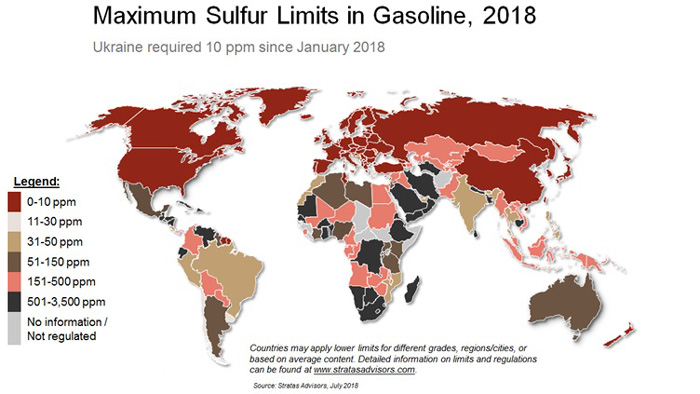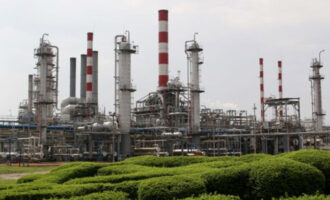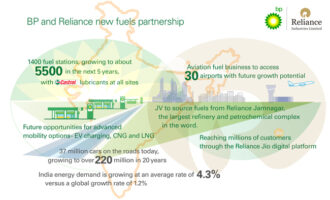
Report ranks countries by gasoline sulfur content
Stratas Advisors, a consulting firm that focuses on the energy sector and related industries, has released its annual Top 100 Ranking on Gasoline Sulfur Limits. The report confirms the continued worldwide movement toward lower sulfur content in gasoline. It cites several countries that have positioned themselves through policy initiatives to make advances in this area in the near future.
EU countries continue to dominate the Top 40, as they were required to implement 100% market penetration of lower than 10 parts per million (ppm) fuels since January 2009. Germany, which led the way with full market penetration in 2003, continues to rank number one. Since none of the top ten countries reduced their national sulfur limit to 10 ppm, the top 55 countries last year retained their ranking this year.
Ten countries moved up or were newly added to the Top 100 in 2019, including Benin, Fiji, Ghana, India, Jordan, Kazakhstan, Kyrgyzstan, Niger, Oman, and Tajikistan.
Out of these ten countries, eight were newly added to the Top 100 ranking for the first time mostly due to the mandatory implementation or voluntary introduction of 10-150 ppm sulfur gasoline over 2012-2019. These include Kazakhstan at 60th place, Ghana at 65th place, Fiji and Oman at 70th place, Niger at 81st place, Benin at 89th place, Kyrgyzstan at 98th place, and Tajikistan at 100th place.
India moved up to number 59, jumping four places, while Jordan jumped eight places to move to number 68.
It is also worthwhile to note that three countries of Argentina, Gabon, and Paraguay also tightened their gasoline sulfur specifications or introduced specifications for lower sulfur gasoline over 2017-2019, but did not move up the ranks possibly because other countries implemented sulfur limits lower than 150 ppm. Even though Argentina has introduced additional specs for 10 ppm sulfur gasoline since January 2019, it dropped four places to rank at number 78.
As for Gabon, new legislation was introduced for the first time since May 2018 requiring a maximum sulfur limit of 150 ppm for gasoline. However, Gabon moved down four places to rank number 88. Last but not least, Paraguay reduced its gasoline sulfur limit from 300 ppm to 200 ppm in July 2017 but dropped five places to rank number 91.
As a result of the continued introduction of 50 ppm and below, eight countries including Myanmar, Indonesia, Malaysia, Malawi, Vietnam, Congo, Egypt, and Bolivia dropped out of the Top 100 in 2019. It is also worthwhile to note that even with a new annual average sulfur limit of 10 ppm implemented since January 2017, Canada and the U.S. dropped in their rankings. Many of the other countries that dropped in their rankings including top gasoline markets such as Brazil and Mexico did not alter their gasoline specifications but were simply overtaken by others that implemented stricter sulfur limits. In the 2019 ranking, Tajikistan ranks at 100th place with a national sulfur limit of 500 ppm, which was the same as its 2018 ranking.









